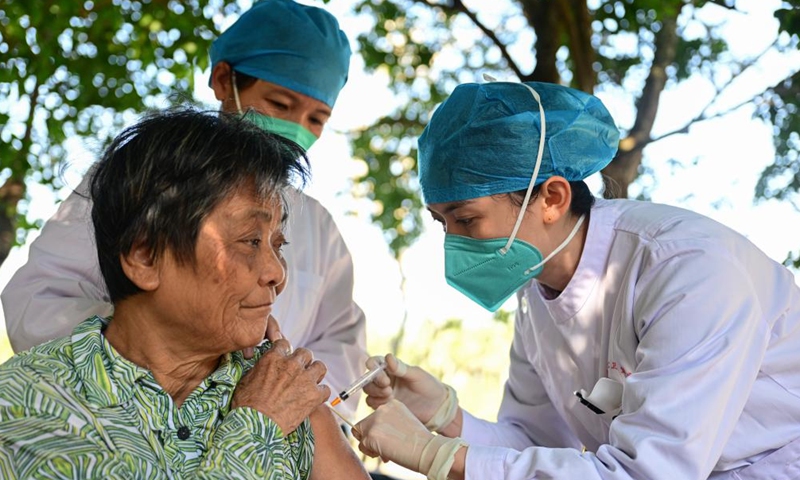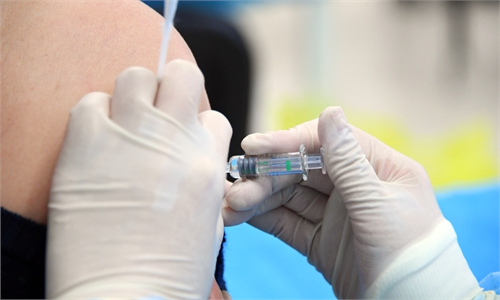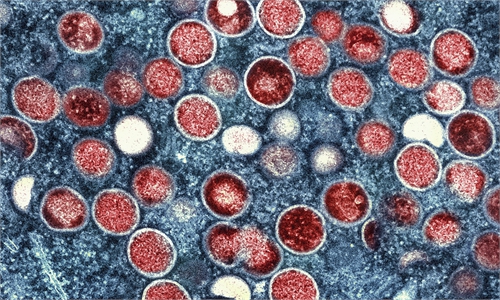
A medical worker administers a dose of COVID-19 vaccine to a senior resident in Hufeng Village of Wenchang, south China's Hainan Province, Dec. 22, 2022. Photo: Xinhua
China is supporting Belt and Road partner countries in building and improving their vaccine research and production systems through jointly building factories and providing localized training, to empower their capacity to combat future large-scale infectious diseases and health crises. Chinese vaccine researchers and providers are demonstrating their commitment to the initiative's guiding principle of "planning together, building together, and benefiting together."
Chinese vaccine providers are making efforts to enhance the accessibility and affordability of essential public health resources in BRI countries. These efforts help BRI partner countries and regions to ensure stable supplies, ultimately allowing their people to benefit from China's advancements in life-science technology.
When COVID-19 struck, the Belt and Road became a life-saving road. China provided more than 10 billion masks and 2.3 billion doses of vaccines to other countries and jointly produced vaccines with over 20 countries, making a special contribution to BRI partners' efforts in fighting COVID-19. China also received valuable support from more than 70 countries when it was hit hard by the pandemic, Chinese President Xi Jinping said at the third Belt and Road Forum for International Cooperation on October 18.
The Global Times learned from Sinovac Biotech, one of China's primary global providers of biopharmaceutical products, that it has provided over 1.2 billion doses of vaccines to 62 BRI partner countries including Indonesia, Turkey, Chile, and South Africa, offering protection against a range of infectious diseases such as COVID-19, hepatitis A, influenza and varicella, as well as pneumococcal infections.
Behind these remarkable figures are 20 research projects in 10 BRI countries, 95 marketing approvals and emergency use authorizations, 17 technology licensing agreements for vaccine production signed in 12 BRI countries, and localized production programs.
The company has also engaged in research and production partnerships, and fostered the development of high-quality vaccines and other biopharmaceutical products under the BRI framework through providing essential training and expertise to local talent.
"In the next stage, Sinovac is looking to support more countries to build entire vaccine research and production systems rather than just exporting products. We hope to establish industrial bases in at least 10 countries in the future, nurturing local talent and providing products and solutions tailored to local pathogens. We believe that we will be better equipped to handle potential health crises in the future," Yang Guang, Chief Business Officer of Sinovac , told the Global Times at a press meeting on Friday.
In Turkey, for example, Sinovac and its local partner have built a formulation and packaging facility that will further enhance the country's vaccine production capacity. In Egypt, Sinovac's advanced automated storage center - the largest in Africa - boosts Egypt's cold chain vaccine storage and distribution capabilities as a vaccine supply center across Africa.
On October 16, at the Indonesia-China Business Forum, China's vaccine supplier CansinoBIO and Etana Biotechnologies Indonesia signed a cooperation agreement in the field of biomedicine, witnessed by Indonesian President Joko Widodo, to deepen collaboration in the technical research and development of inhaled tuberculosis vaccines.
The two parts will also continue to promote cooperation in products such as quadrivalent meningococcal conjugate vaccines and COVID-19 vaccines, aiming to effectively combat disease threats and introduce more innovative, high-quality, and accessible vaccine products to Southeast Asia.
Another state-owned pharmaceutical enterprise, Sinopharm Group, has conducted trade exchanges with more than 60 BRI partner countries. Currently, the group has over 40 overseas institutions located in Asia, Africa, America, and Europe. The functions of these overseas institutions have diversified.
Sinopharm has also boosted medical resources in some Southeast Asian countries. For example, from May to October 2018, Sinopharm Group donated 40 mobile clinics to Cambodia in two batches. These mobile clinics are large 12-meter-long buses equipped with more than 20 devices, including digital X-ray machines, color ultrasound machines, and other equipment for various examinations and treatments in radiology, dentistry, pediatrics, and laboratory testing.
Health has always been an important component of the Belt and Road Initiative, and Chinese vaccine suppliers actively promote the concept of a "community of shared future for human health," achieving a transformation from integration into leading health globalization along the Belt and Road.



